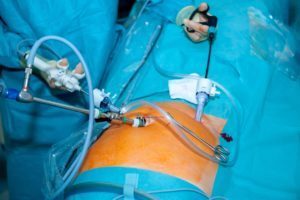Hysterectomy is a surgical procedure whereby the uterus (womb) is removed. Every year in Australia, 30,000 women undergo a hysterectomy. The majority of these hysterectomies are performed for benign problems, and a small proportion of hysterectomies in Australia are performed due to gynaecological cancers.
Benign Indications for hysterectomy include:
- Heavy menstrual bleeding
- Fibroids
- Severe endometriosis
- Adenomyosis (endometriosis within the muscle wall of the uterus)
- Severe period pain
- Vaginal Prolapse
Hysterectomy may be needed as part of the surgical treatment for gynaecological cancers, including:
- Uterine cancer (Endometrial cancer)
- Ovarian cancer
- Cervical cancer
- Fallopian tube cancer
Types of Hysterectomies
In general, hysterectomy may be performed via 3 different approaches:
- Laparoscopic hysterectomy (keyhole hysterectomy)
- Open hysterectomy
- Vaginal hysterectomy
Compared to traditional abdominal hysterectomy, the benefits of laparoscopic hysterectomy and vaginal hysterectomy include faster recovery and a shorter hospital stay, and less post-operative pain and infection risk. Most women are discharged home after 1-2 nights in hospital following a vaginal or laparoscopic hysterectomy.
However, not all gynaecological conditions and diseases are suitable for vaginal or laparoscopic hysterectomy. For example, for ovarian cancer surgery, multiple other intra-abdominal procedures are usually performed as part of staging and treatment for the ovarian cancer, and an open hysterectomy is required in this situation.
Menopause After Hysterectomy
After women undergo a hysterectomy, it does NOT necessarily mean that they will go through the menopause straight after surgery. It depends on whether the ovaries are removed or preserved during their surgery. In pre-menopausal women having a hysterectomy for benign reasons, the ovaries are often preserved after a hysterectomy, unless there are other indications which require the ovaries to be removed. On the other hand, removal of the ovaries is a recommended as part of the complete treatment for some gynaecological malignancies (e.g. endometrial cancer). If both ovaries are removed at the time of surgery, then you will go through the menopause post-operatively. Whether the ovaries will be removed as part of your hysterectomy surgery will be discussed before your operation.
Hysterectomy by Brisbane Gynaecologist Dr Amy Tang
Dr Amy Tang is a Brisbane Gynaecologist and female Gynaecological Oncologist who specialises in performing Total Laparoscopic Hysterectomy for benign and malignant gynaecological conditions. To discuss your specific circumstances and symptoms, please contact Dr Amy Tang to arrange a consultation.












